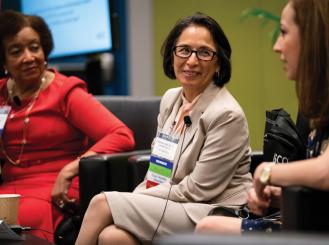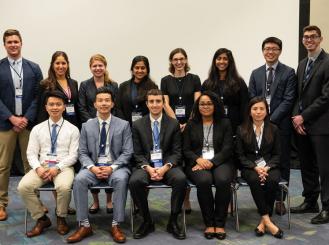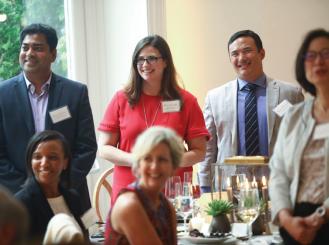Sep 10, 2018
By Carson Rolleri, ASCO Communications
To have a successful career in oncology, ambitious oncologists need to accomplish many things, including investing their time and effort into professional development activities. ASCO is committed to empowering its members to reach their career goals by providing career development, mentoring, and leadership opportunities. By offering a robust portfolio of career-enhancing programs to its membership, ASCO is working to create the oncology leaders of tomorrow and help you achieve the career you want.
Making the Next Move: Career Development and Mentoring
ASCO’s career development and mentoring resources are designed to support members at all career stages, from medical students with an interest in oncology to mid-career oncology professionals looking to further develop their network and skill base.
Trainee and Early-Career Oncologist Lounge
The ASCO Annual Meeting features several onsite career development workshops, sessions, and resources for those looking to further their career. For early-career oncologists and oncologists in training, the Trainee Lounge offers an array of resources, with educational sessions and talks hosted by experienced oncologists on topics that are vital for a successful career. Previous presentations include contract negotiations, how to choose a fellowship, how to navigate the Annual Meeting, and more. The lounge also offers mock job interviews, a one-on-one opportunity where trainees can meet with an experienced oncologist to receive career advice and feedback on their CV.
“In the Trainee and Early Career Oncologist Lounge, I always find friendly staff and a dedicated space where I can connect with other colleagues and have an opportunity to digest all the new data being presented at the Annual Meeting,” said lounge attendee turned presenter Filipa Lynce, MD. “As a presenter of a topic or guide of the Breast Poster Walk, I had a chance to interact with fellows and other junior faculty, listen to their questions and comments, and learn with them. It is definitely a big plus of the meeting!”
Guided poster walks are a lounge favorite: attendees can join experienced oncologists who lead a group of six to eight trainees on a guided tour of the General Poster Session, highlighting “need-to-know” posters from the Annual Meeting and answering questions. The lounge also hosts a small-group opportunity during which six to eight trainees can meet with a subject matter expert to engage in an intimate, informal discussion focused on a specific topic. For the 2018 ASCO Annual Meeting, discussion topics included geriatric oncology and advocacy.
Beyond the Annual Meeting, the Society maintains the ASCO Career Center, a 24/7 online resource which provides listings to hundreds of oncology job openings for those looking for their next career move. Through the Career Center, you can create a personalized profile with your uploaded resume, access custom searches and job alerts, view your application history, and explore featured employers and positions that are highlighted monthly.
Women’s Networking Center
The ASCO Annual Meeting is also home to the Women’s Networking Center, established in 2015. The center hosts a number of small-group and panel discussions to talk about the unique challenges women face in oncology, with presentations by women in ASCO leadership including ASCO President Monica M. Bertagnolli, MD, FACS, FASCO, and past presidents Julie M. Vose, MD, MBA, FASCO, and Sandra M. Swain, MD, FACP, FASCO. Previous sessions have included “Impact of Life Transitions on Your Career,” “Female Leadership: Presenting Your Brand,” and “Promoting Diversity and Inclusion.” (Read more about women in oncology and gender disparities in medical leadership.)
“The ASCO Women’s Networking Center is an amazing resource that I wish I had discovered earlier in my career,” said center attendee and “Negotiation Skills: Getting What You Need” presenter Marjorie C. Green, MD. “The scheduled talks help women to build skills not usually taught in medical or graduate school and are amazing. Beyond the talks and sessions, there is incredible value from having a dedicated place to gather for informal networking. You can make connections with women in academics, research, and industry, providing a great opportunity to build relationships that last beyond ASCO and positively influence your life and career.”
The Women’s Networking Center also includes Mentoring Office Hours, which is the only session at the center that requires advanced registration. These 30-minute, one-on-one conversations are between two women in oncology, where the mentee can ask questions about professional goals and career moves and make connections with a more experienced woman in the field. The conversation is run by the mentee to fit her needs and interests.
“Providing a forum for women, particularly earlier in their careers, to use the collective experiences of other women and share their own experiences and challenges in an open and supportive environment is extremely important,” said Rachel Sanborn, MD, center attendee and “Overcoming Bias” presenter. “For many different reasons, women benefit and can be empowered by the ability to discuss their unique opportunities and challenges in a setting in which they do not fear stigmatization and realize they are not alone.”
Online, the Women in Oncology blog on ASCO Connection is a collection of personal stories by women members in which they share challenges, insights, and advice regarding navigating careers, personal growth, and professional development. With its first post published in February 2017, the Women in Oncology blog has grown to feature ASCO luminaries and their experiences and reflections on their careers in oncology, work-life balance, parenthood, leadership, emotional vulnerability, and more.
Mentorship Opportunities
To engage the Society’s international and domestic early-career membership, ASCO has established the Virtual Mentors Program, which pairs early-career ASCO members with a mentor. These mentors are ASCO members who have at least 10 years of oncology experience. An accessible program for participants around the world, travel is not a component of the program for international members. In this virtual program, mentors and mentees communicate through email, phone, or video conferencing to help develop the mentee’s clinical and research interests and professional goals.
ASCO also offers the Diversity Mentoring Program, which is designed to encourage medical students and residents from populations underrepresented in medicine to pursue rewarding careers in oncology. The program seeks to educate physicians-in-training by fostering relationships with experienced oncologists who can provide career and educational guidance and serve as a professional resource.
Cancer Interest Groups
Piquing the interest of medical students in oncology careers is of the upmost importance, now more than ever. In an ASCO-commissioned study, researchers found that with an aging and growing population, increasing numbers of cancer survivors, and a slower growth in the oncology workforce, there will be a shortage of 2,550 to 4,080 oncologists by 2020.1
Understanding this need to provide programming for and engage the interest of the next generation of physicians, ASCO offers free membership to medical students. As part of this membership, medical students get access to numerous training and education materials, including ASCO University Tumor Boards and ASCO University Exam Preparation. Furthermore, ASCO has connected a global network of medical students interested in oncology through its Cancer Interest Group (CIG) program, which seeks to support and educate future cancer care providers. The CIG program provides oncology interest groups with annual support funds, mentors, an online networking portal, free student registration for the ASCO Annual Meeting, and the opportunity to submit research to a medical student-specific Abstract Forum at the meeting.
ASCO’s Training Programs: How to Become a Leader
Outside of its mentoring and career development activities, ASCO offers a portfolio of prestigious leadership training opportunities for those who are ready to take the next leap in their career: the Leadership Development Program, the Health Policy Leadership Development Program, and the newly formed Education Scholars Program.
“By developing these programs and investing in oncology professionals at this time in their careers, ASCO is investing in the future,” said past Leadership Development Program participant Alexandra Thomas, MD, FACP. “Programs such as the Leadership Development Program and the new Education Scholars Program ensure the sustainability of our collective work towards a world with less suffering from cancer. Importantly, ASCO is clear that while this program supports future ASCO leaders, it is also an investment in oncology professionals who will go on to lead and advocate for improved cancer care in a wide variety of arenas including professional societies, academic organizations, and the public and private sectors.”
Applications for the following programs close on September 25, 2018, at 11:59 PM EST. If you have any questions about the programs or applications, contact professionaldevelopment@asco.org.
Leadership Development Program
ASCO’s Leadership Development Program (LDP) began in 2009 and was created to teach mid-career physicians (post subspecialty training) leadership skills and help them gain exposure to the role and mission of ASCO. During their year-long term in the program, participants receive mentorship from ASCO leaders, with the end goal of facilitating the promotion of program graduates into leadership positions in ASCO.
“We typically would learn how to be a leader from those who are one step ahead of us in their careers, but leadership is actually a skill set that can be fostered and, if attention is paid and time devoted, that skill set can be used to affect change and foster the growth of others,” explained 2010-2011 LDP participant and current ASCO Board of Directors member Arti Hurria, MD, FASCO.
The program has a strong emphasis on creating connections with other participants: at the beginning of the program, the class is divided into four teams and assigned to research ASCO strategic issues. After practicing the skills learned throughout the program with their team, participants then work on a team project throughout the year that is presented to the ASCO Board of Directors. The class is capped at 16 ASCO members, with one spot reserved for an oncologist from outside of the United States. (Read more about the experiences of international LDP participants.)
“As an oncologist in academic medicine, I have had various opportunities for leadership in my institution come my way,” said 2017-2018 LDP participant Merry Jennifer Markham, MD, FACP. “As these started happening, however, I realized that I had no formal training in leadership. I had access to mentors who were wonderful leaders, and of course I’ve learned from them, but I felt I needed to hone my skills in a more organized way. The ASCO LDP provided an opportunity to do this in the setting that is most relevant to my career in oncology.”
“The leadership skills imparted in the many sessions, the collaborative spirit amongst our own group as well as the group at large, and exposure to ASCO’s leadership, structure, and activities have opened more opportunities and avenues for collaboration,” said 2017-2018 LDP participant Jeanny B. Aragon-Ching, MD, FACP.
Health Policy Leadership Development Program
The Health Policy Leadership Development Program, formerly known as the Health Policy Fellowship, is a 1-year program that provides a meaningful and unique opportunity for ASCO members to develop expertise in health policy, advocacy, and grassroots activity. The Health Policy Leadership Development Program offers practical experience working with ASCO Policy and Advocacy staff and policy counsel in crafting policy positions and statements; small-group teaching sessions delivered by an executive leadership coach, ASCO professional staff, and qualified volunteers; training in communication, leadership, and advocacy; and a mentored project that advances an ASCO policy initiative. Participants will also be full members of the ASCO Leadership Development Program, gaining valuable leadership skills and mentorship from ASCO leaders while building expertise in health policy. Read more about this year’s fellows, Sheetal Kircher, MD, and Trevor Royce, MS, MD, MPH.
Education Scholars Program
Education is at the core of ASCO’s mission, and advances in learning science have provided an opportunity to enhance the educational activities ASCO offers. The Education Scholars Program (ESP) was created to bring together a group of clinical educators and train them in learning science, advance clinician education, and foster a community of likeminded educators.
“I strongly believe that the way we currently learn in medicine is inherently flawed,” explained ESP participant Eric Roeland, MD. “We drink from a firehose of information and are expected to apply drops of this information. [Through ESP], I aim to learn about educational theory and strategize optimal new ways to learn and teach.”
As part of the program, participants are tasked with understanding cognitive science and learning theory and develop leadership skills, with the practical goal of further integrating learning science into ASCO’s educational activities and advancing medical education. The year-long program includes in-person trainings, conference calls, and an independent learning project.
“As oncologists, learning is an inherent role of our profession,” Dr. Roeland said. “As a consequence of our successes in oncology, there is an increasing demand to learn a lot of information at a staggering pace and volume. How we engage and distill the most scientifically robust and clinically sound information is becoming a growing challenge for us all. We must learn to identify, analyze, and apply the most critical and up-to-date information to provide the best care for our patients with cancer.”
Your Next Steps
These programs described here are just a sampling of the professional development activities that ASCO offers its members. Learn more and get involved.
Reference
- AAMC Center for Workforce Studies. Forecasting the Supply of and Demand for Oncologists: A Report to the American Society of Clinical Oncology (ASCO) from the AAMC Center for Workforce Studies. 2007.
2018-2019 ASCO Leadership Development Program Participants
- Tareq Al Baghdadi, MD
- Carey K. Anders, MD
- Aditya Bardia, MD
- M. Shaalan Beg, MD, MS
- Mariana Chavez Mac Gregor, MD
- Alden Chiu, MD, MPH
- Richard T. Lee, MD
- Cornelia Liedtke, MD, PhD
- Raymond Liu, MD
- Shail Maingi, MD
- Heather McArthur, MD, MPH
- Nathalie Dauphin McKenzie, MD, MSPH
- Sogol Mostoufi-Moab, MD, MSCE
- Ashley Love Sumrall, MD, FACP
- Mylin Torres, MD
- Andrew Z. Wang, MD
2018-2019 Education Scholars Program Participants
- Maria Quintos Baggstrom, MD
- Nishin A. Bhadkamkar, MD
- Jeremy Paul Cetnar, MD, MSHPR
- Julia Lee Close, MD
- Meredith Giuliani, MBBS, FRCPC, MEd
- Simon Hughes, MBBS, MD
- Annie Im, MD
- Issam Makhoul, MD
- Adriana Kaczaraj Malone, MD
- Kristen A. Marrone, MD
- Eric J. Roeland, MD
- Jennifer Tseng, MD



